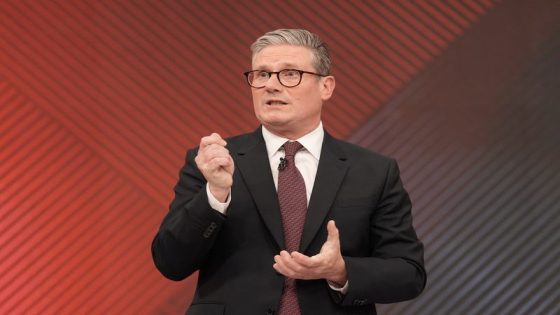LONDON (Reuters) – British opposition Labour leader Keir Starmer will unveil his party’s agenda for government on Thursday, putting wealth creation and economic growth at the heart of his pitch to voters before a July 4 election that polls say he is on course to win.
With three weeks to go before the election, Starmer is the latest leader to launch his party’s manifesto, a blueprint for what Labour would do in government and one he described as setting out “a total change in direction”.
Just two days after Prime Minister Rishi Sunak revealed 17 billion pounds ($21.8 billion) of tax cuts in his Conservative manifesto, Labour will say its proposals contrast with “the desperate, unfunded wishlist” of the governing party by being a “serious, fully costed, fully funded plan for change”.
It will also mark a clear break from Labour’s long-held image of being a ‘tax and spend’ party – a message that might further alienate those on the left of the party.
“This is a manifesto for wealth creation – that is our number one priority,” Starmer will say, according to excerpts of his speech. “The mandate we seek from Britain at this election is for economic growth.”
Long criticised as a party that relies on higher taxes to fund public services, Starmer will say he rejects that idea, instead wanting a Labour government to be focused on creating wealth – part of a strategy to get business to help finance many of the party’s projects and spur Britain’s meagre growth.
“So let me be crystal clear – this manifesto is a total rejection of that argument,” he will say, promising to reform planning rules, change the infrastructure that supports investment and transform the jobs market.
“This changed Labour Party has a plan for growth. We are pro-business and pro-worker. The party of wealth creation.”
After a years-long business charm offensive, Starmer’s message is part of his bid to convince voters that Labour has changed since being led by left-wing veteran Jeremy Corbyn, who presided over the party’s worst defeat for 84 years in 2019.
Starmer has dragged Labour to the centre-ground and his team now repeats its stance that it will stick to strict spending rules, with finance policy chief Rachel Reeves describing her approach as one set “on the basis of iron discipline”.
It has approached the election campaign in a similar way. Concerned about losing its around 20 percentage point lead over the Conservatives in the polls, Labour has refused to be swayed by arguments even from within the party to be bolder with its offering, instead sticking to its core policies.
Some voters, business leaders and critics say that approach has meant that they have little clarity on the detail of what the party will offer in some of its biggest policy areas, such as its strategy to spur investment in tackling climate change.
They will be hoping for more detail in its manifesto.
($1 = 0.7797 pounds)
(Reporting by Elizabeth Piper; Editing by Ros Russell)
Source Agencies



